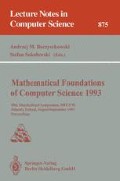Abstract
Feature Constraint Systems have been proposed as a logical data structure for constraint (logic) programming. They provide a record-like view to trees by identifying subtrees by keyword rather than by position. Their atomic constraints are finer grained than in the constructor-based approach. The recently proposed CFT [15] in fact generalizes the rational tree system of Prolog II.
We propose a new feature constraint system EF which extends CFT by considering features as first class values. As a consequence, EF contains constraints like x[υ]ω where υ is a variable ranging over features, while CFT restricts υ to be a fixed feature symbol.
We show that the satisfiability of conjunctions of atomic EF-constraints is NP-complete. Satisfiability of quantifier-free EF-constraints is shown to be decidable, while the ∃*∀*∃* fragment of the first order theory is undecidable.
Supported by the Bundesminister für Forschung und Technologie (contract ITW 9105), the Esprit Basic Research Project ACCLAIM (contract EP 7195) and the Esprit Working Group CCL (contract EP 6028).
Preview
Unable to display preview. Download preview PDF.
References
H. Aït-Kaci. An algebraic semantics approach to the effective resolution of type equations. Theoretical Comput. Sci., 45:293–351, 1986.
H. Aït-Kaci and R. Nasr. LOGIN: A logic programming language with built-in inheritance. Journal of Logic Programming, 3:185–215, 1986.
H. Aït-Kaci, A. Podelski, and G. Smolka. A feature-based constraint system for logic programming with entailment. In Int. Conf. on 5th Generation Computer Systems, pages 1012–1021, 1992.
R. Backofen. On the decidability of functional uncertainty. In Rewriting Techniques and Applications, LNCS, 1993. Springer-Verlag.
R. Backofen and G. Smolka. A complete and recursive feature theory. In Proc. of the 31th ACL, Columbus, Ohio, 1993. Complete version as DFKI Research Report RR-92-30.
A. Colmerauer. Equations and inequations on finite and infinite trees. In 2nd Int. Conf. on 5th Generation Computer Systems, pages 85–99, 1984.
H. Comon. Unification et disunification. Theorie et applications, 1988. Doctoral Thesis, Institut National Polytechnique de Grenoble.
M. R. Garey and D. S. Johnson. Computers and Intractability. A Guide to the Theory of NP-Completeness. W. H. Freeman and Company, New York, 1979.
J. Jaffar and J.-L. Lassez. Constraint logic programming. In 14th POPL, pages 111–119, Munich, Germany, Jan. 1987. ACM.
M. Johnson. Attribute-Value Logic and the Theory of Grammar. CSLI Lecture Notes 16. Center for the Study of Language and Information, Stanford University, CA, 1988.
E. Kounalies, D. Lugiez, and L. Potier. A solution of the complement problem in associative-commutative theories. In MFCS 1991, LNAI, vol. 520, pages 287–297, Springer-Verlag.
M. J. Maher. Complete axiomatizations of the algebras of finite, rational and infinite trees. In Third LICS, pages 348–357. 1988.
G. Smolka. Feature constraint logics for unification grammars. Journal of Logic Programming, 12:51–87, 1992.
G. Smolka, M. Henz, and J. Würtz. Object-oriented concurrent constraint programming in Oz. Research Report RR-93-16, Deutsches Forschungszentrum für Künstliche Intelligenz, Stuhlsatzenhausweg 3, D-W-6600 Saarbrücken, Germany, Apr. 1993.
G. Smolka and R. Treinen. Records for logic programming. In K. Apt, editor, Proceedings of the Joint International Conference and Symposium on Logic Programming, pages 240–254, 1992.
G. Smolka and R. Treinen. Records for logic programming. Research Report RR-92-23, Deutsches Forschungszentrum für Künstliche Intelligenz, Stuhlsatzen-hausweg 3, D-W-6600 Saarbrücken, Germany, Aug. 1992.
R. Treinen. A new method for undecidability proofs of first order theories. Journal of Symbolic Computation, 14(5):437–457, Nov. 1992.
R. Treinen. On feature constraints with variable feature access. Research Report RR-93-21, Deutsches Forschungszentrum für Künstliche Intelligenz, Stuhlsatzenhausweg 3, D-W-6600 Saarbrücken, Germany, 1993.
K. N. Venkataraman. Decidability of the purely existential fragment of the theory of term algebra. J. ACM, 34(2):492–510, Apr. 1987.
Author information
Authors and Affiliations
Editor information
Rights and permissions
Copyright information
© 1993 Springer-Verlag Berlin Heidelberg
About this paper
Cite this paper
Treinen, R. (1993). Feature constraints with first-class features. In: Borzyszkowski, A.M., Sokołowski, S. (eds) Mathematical Foundations of Computer Science 1993. MFCS 1993. Lecture Notes in Computer Science, vol 711. Springer, Berlin, Heidelberg. https://doi.org/10.1007/3-540-57182-5_64
Download citation
DOI: https://doi.org/10.1007/3-540-57182-5_64
Published:
Publisher Name: Springer, Berlin, Heidelberg
Print ISBN: 978-3-540-57182-7
Online ISBN: 978-3-540-47927-7
eBook Packages: Springer Book Archive

